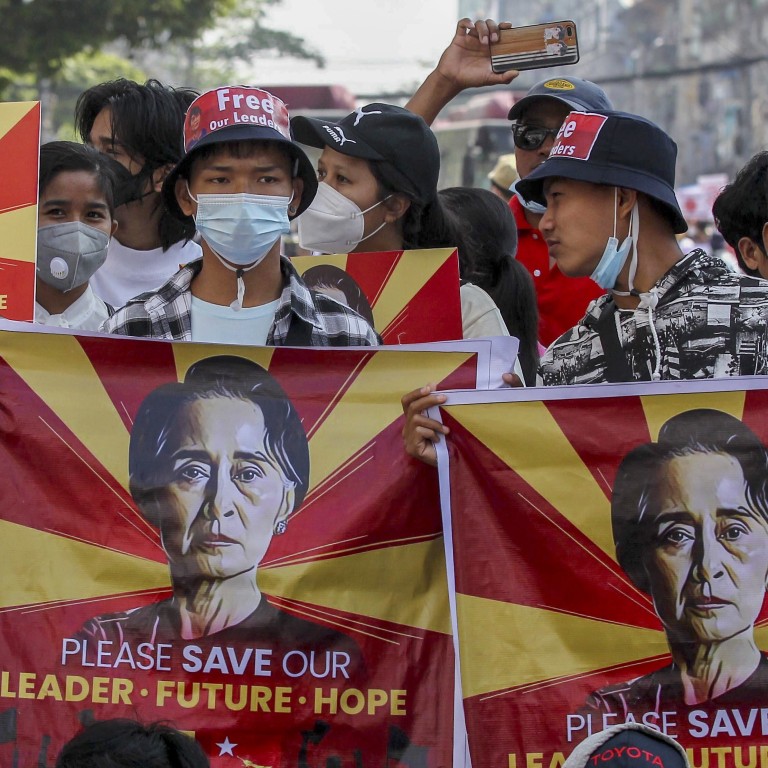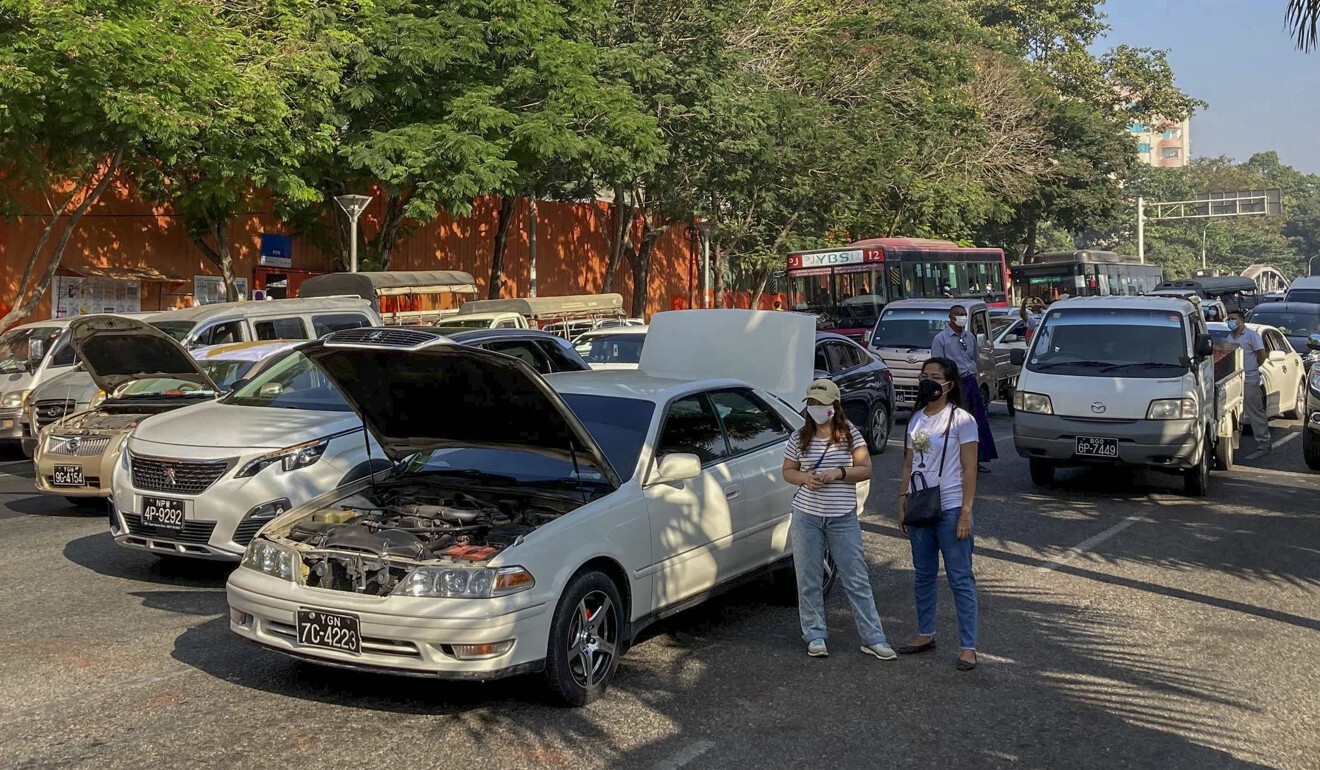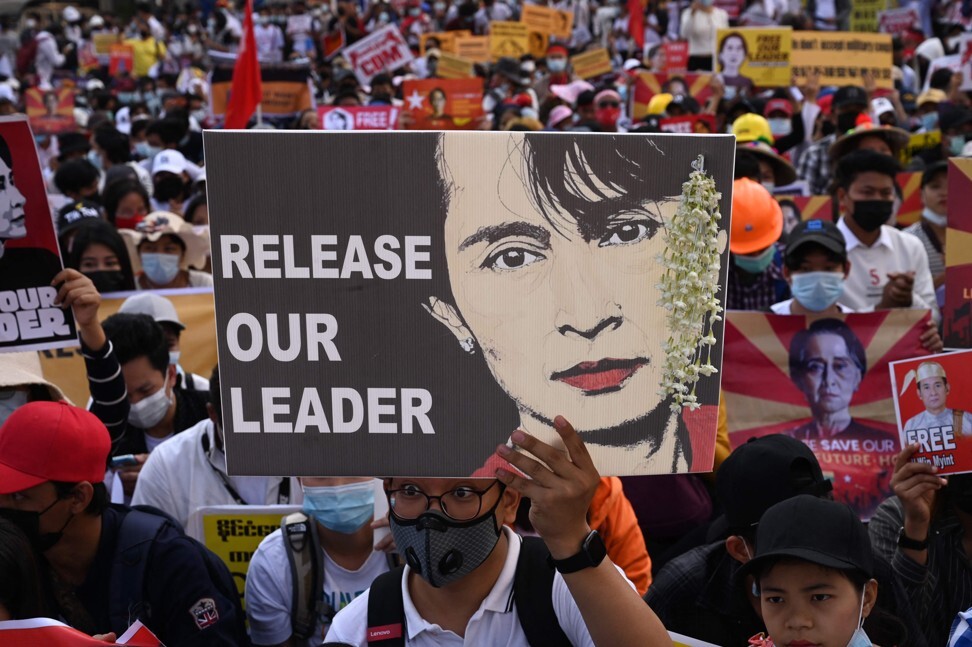
Myanmar coup opponents block roads, as UN warns of violence against protesters
- Protesters have vowed a show of force against military leaders after an additional charge was filed against Aung San Suu Kyi
- The UN fears the situation is spiralling out of control and warned that violence could escalate, amid reports extra troops were sent to Yangon
Protesters are deeply sceptical of the junta’s assurances, given at a news conference on Tuesday, that there would be a fair election and it would hand over power, even as police filed an additional charge against Suu Kyi.
The Nobel Peace laureate, detained since the February 1 coup, now faces a charge of violating a Natural Disaster Management Law as well as charges of illegally importing six walkie talkie radios. At a hearing by video conference on Tuesday, her next hearing was set for March 1.
China under US pressure to condemn Myanmar military coup
“We’re showing here that we’re not in that 40 million they announced,” Sithu Maung, an elected member of Suu Kyi’s National League for Democracy (NLD) told a cheering crowd at the Sule Pagoda, a central protest site in the main city of Yangon.
Brigadier General Zaw Min Tun, spokesman for the ruling council, told the Tuesday news conference that 40 million of the 53 million population supported the military’s action, which he said was in line with the constitution.
The army alleges there was fraud in a November 8 election won by Suu Kyi’s party that had been expected to pave the way for democratic reform.
We have to fight until the end. People need to come out on the streets
A protester who gave her name as Khin was scornful of that. “What they said was totally untrue ... They said there was vote fraud but look at the people here,” she said.
“We have to fight until the end,” said Nilar, a 21-year-old student who asked not to use her real name. “We need to show our unity and strength to end military rule. People need to come out on the streets.”
The coup that cut short the Southeast Asian country’s unsteady transition towards democracy has prompted daily demonstrations since February 6, some drawing hundreds of thousands of people.

02:32
Myanmar coup: street orchestra fights military dictatorship with protest song
The takeover has also drawn strong Western criticism, with renewed anger from Washington and London over the additional charge for Suu Kyi. Although China has taken a softer line, its ambassador in Myanmar on Tuesday dismissed accusations it supported the coup.
UN Special Rapporteur Tom Andrews said he feared the possibility of violence against the protesters and made an urgent call on any country with influence over the generals, and businesses, to press them to avoid it.
“In the past, such troop movements preceded killings, disappearances, and detentions on a mass scale,” he said in a statement issued late on Tuesday by the UN Human Rights office in Geneva.
“I am terrified that given the confluence of these two developments – planned mass protests and troops converging – we could be on the precipice of the military committing even greater crimes against the people of Myanmar.”

In Yangon and elsewhere, motorists responded to a “broken-down car campaign” spreading on social media, stopping their supposedly stalled cars, with bonnets raised, on streets and bridges to block them to police and military trucks.
“We want the truth ... and the release of Aung San Suu Kyi and President Win Myint,” said Ko Ye, 26, whose taxi was part of the break-down protest at the Sule Pagoda.
Right outside the capital Naypyidaw, tens of thousands of people from different sectors – including engineers, doctor, and teachers – marched through the logging town of Pyinmana carrying signs saying “Help Myanmar”.
Myanmar’s Gen Z protesters defy military with satirical signs
Myanmar’s Assistance Association for Political Prisoners group said more than 450 arrests had been made since the coup, many of them in night-time raids. Those arrested include much of the NLD’s senior leadership.
The president was also detained on the day of the coup.
The suspension of the internet at night has added to a sense of fear.
BACK UNDER HOUSE ARREST
Zaw Min Tun told the news conference, the junta’s first since the coup, the military was giving a guarantee that at an election would be held and power handed to the winner. He gave no time frame, but said the army would not be in power for long.
The last stretch of army rule lasted nearly half a century before democratic reforms began in 2011.
Suu Kyi, 75, spent nearly 15 years under house arrest for her efforts to end military rule.
Timeline: from Aung San Suu Kyi’s detention to mass protests and more
A court hearing of Suu Kyi on two separate charges began on Tuesday, a day earlier than scheduled, her party-appointed lawyer Khin Maung Zaw said.
Speaking by phone on Wednesday, Khin Maung Zaw said that Suu Kyi appeared in front of the court via video link without representation. He said the court had yet to recognise him as her lawyer and he had been barred from seeing her since she was detained on February 1.
The unrest over her detention has revived memories of bloody suppression of protests under previous juntas.
Police have opened fire several times, mostly with rubber bullets, to disperse protesters. A protester who was shot in the head in Naypyitaw last week is not expected to survive.
A policeman died of injuries sustained during a protest in the city of Mandalay on Monday, the military said.
As well as the demonstrations in towns across the ethnically diverse country, a civil disobedience movement has brought strikes that are crippling many functions of government.
Singapore’s foreign minister says sweeping Myanmar sanctions won’t work
Activist Min Ko Naing, a veteran of 1988 protests that the military crushed, said the disobedience campaign was key this time.
“They think if the leader is arrested, nothing can be done, but that’s not working anymore,” he said in a taped message to the crowd.
Actor Pyay Ti Oo said resistance could not be doused.
“They say we’re like a brush fire and will stop after a while, but will we? No. Won’t stop until we succeed,” he told the crowd.
Additional reporting by AFP, AP, Bloomberg



